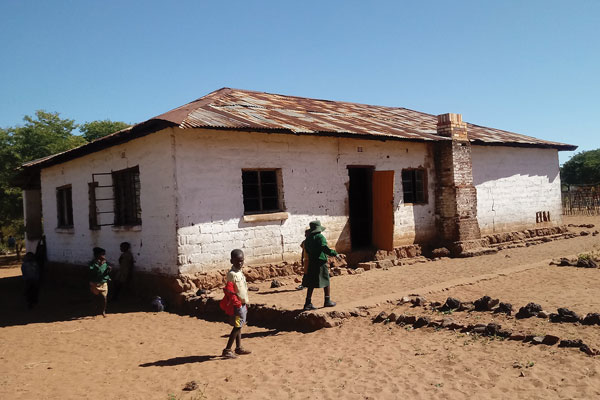

BY MTHANDAZO NYONI
SIFISO Ndebele, a Grade 5 pupil at Samukele Primary School in Matabeleland North, dreams of becoming a scientist.
But sadly, her dream is not in tandem with the learning conditions at her school.
Her school has extremely poor infrastructure, with pupils from ECD A up to Grade 6 sharing an old dilapidated corrugated iron-roofed farmhouse as a “classroom,” while their teachers use grass-thatched huts as living quarters.
The school, established in 2013, with an enrolment of 115 pupils, does not have enough desks, chairs, blackboards and other basic equipment.
Samukele, an annex of Maraposa Primary School, only has three teachers.
Such is the situation at a school expected to produce scientists, doctors, engineers, teachers among other professionals.
“Our pupils are average and below average. We are having a challenge of composite classes as well as inadequate learning and teaching materials. Given enough resources and proper infrastructure, these pupils will do wonders,” Maraposa headmaster Jethro Dube told Southern Eye recently during a visit to the school when the Environmental Management Agency was launching the national fire week programme.
- Chamisa under fire over US$120K donation
- Mavhunga puts DeMbare into Chibuku quarterfinals
- Pension funds bet on Cabora Bassa oilfields
- Councils defy govt fire tender directive
Keep Reading
Teacher-in-charge of the school, Sinqobile Lerato Seremwe said they currently have about 100 bags of cement bought through a government grant.
“We need building materials as well as labour. Our aim is to construct at least three classroom blocks, for a start, but without building material it’s difficult,” she said.
The school, situated in ward 10, Umguza district, was established to cater for children who were walking more than 20 kilometres daily, to and from the nearest school.
Due to its poor infrastructure and being an annex school, Samukele is not allowed to run Grade 7 examinations and as such, after finishing Grade 6, pupils are referred to Maraposa for Grade 7, thereby enduring the 20km distance they were trying to avoid.
Worse still, ward 10 does not have a secondary school. So from Grade 7, children will endure another 40km distance to the nearest Mahlothova Secondary School.
“Due to the long distances, our children end up dropping out of school at a tender age. The love for school just diminishes,” ward 10 councillor, Luke Ndlovu said.
“Some parents end up renting accommodation for their children near the school, but that is also costly. Parents are in a catch-22 situation,” he said.
A villager, Gift Sibanda appealed to government and non-governmental organisations to assist by building proper primary and secondary schools in the area.
In his 39th independence day anniversary children’s party address, President Emmerson Mnangagwa said the provision of quality and relevant education would be a key priority area of his government in order to lay a firm foundation for the development of an appropriately skilled human resource base for the socio-economic requirements of the country.
“As government, we will continue to ensure that optimum resources are put in place in schools in order to improve the learning outcomes,” Mnangagwa said.
“We recognise the importance of the development and provision of requisite learning materials, as such; government has procured textbooks for the new curriculum for distribution to schools throughout the country, beginning with the most disadvantaged.
“In addition, I challenge the Ministry of Primary and Secondary Education to ensure that all schools have well-resourced libraries and laboratories to engage research and development as well as to train and groom the young generation with the requisite skills,” he added.
But sadly, the status quo at Samukele still remains the same.
No classrooms, inadequate learning and teaching materials, few teachers and no sporting facilities — are the order of the day.
In fact, there is nothing except misery and dejection written on the faces of children and teachers.
Such an unpalatable and child unfriendly school environment is raising concern.
The newly-introduced curriculum will be difficult to implement under such conditions.
The new curriculum introduced mass displays, physical education, separation of content and agriculture at primary school level, while subjects like Building and Fashion and Fabrics are now referred to as Building Technology and Design and Textile Technology Design, respectively.
Classrooms, sporting fields and electricity are key to implementation of the curriculum — things that Samukele lack.
Matabeleland North provincial education director Jabulani Mpofu said something was being done to address infrastructural challenges schools in the province face.
“We are doing something and it’s a matter of time. We have many satellite schools in Matabeleland North and you can’t build them at one go. At the moment, 10 schools are being built in Matabeleland North,” Mpofu said.
Mpofu urged communities to initiate building of new schools in their communities as it was their responsibility.
Recently, Primary and Secondary Education minister Paul Mavima revealed that Zimbabwe has a deficit of more than 2 000 schools, especially in new settlements and rural areas, resulting in children learning in tobacco barns.
A number of schools in Matabeleland have poor infrastructure and many qualified teachers do not want to be deployed there. Due to lack of resources and shortage of qualified teachers, the pass rate for most of the schools perpetually sits at 0%.
“A number of teachers do not want to teach at this school due to poor infrastructure. One teacher literally cried and refused to teach these poor pupils. It’s so sad that government continues to neglect schools such as this one yet developing schools in urban areas,” said one teacher at the school who requested anonymity.











